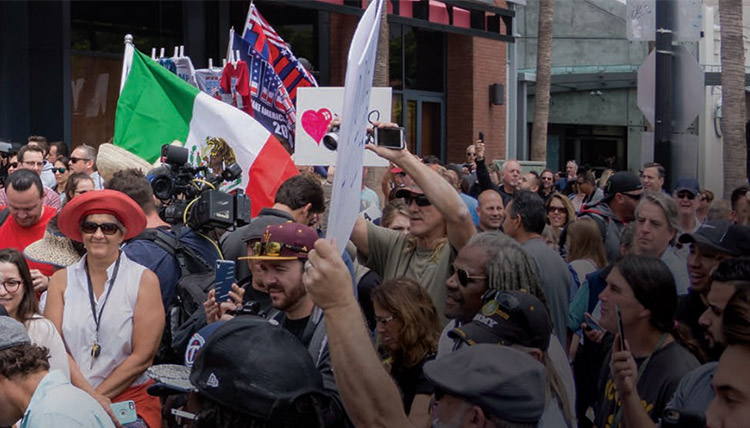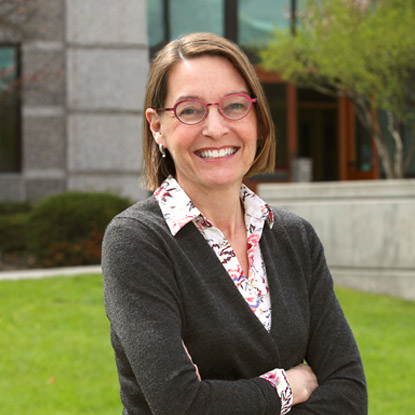
Every year, millions of people around the world are displaced from their homes by persecution and violence. Gonzaga Professor of Law Megan J. Ballard explores legal protections for those individuals, with particular concern for post-conflict property restitution and refugee integration.
President Trump, one week into his presidency, temporarily closed U.S. borders to refugees because of national security concerns. While a policy shift at the time, the United States has a past record of excluding immigrants based on race, religion, national origin, gender, and sexual orientation to protect national security and prevent cultural conflict. Many of these historical barriers to immigration have proved either unconstitutional, unwise, or both. Lawyers and others have criticized the executive order on similar grounds. At a time when record numbers of people around the globe have fled their homes due to persecution, violence, or human rights abuses, closing U.S. borders will only expose refugees to continued risks, while failing to enhance safety in the United States. Moreover, the administration’s refugee ban, coupled with its anti-immigrant rhetoric, has fueled xenophobic and racist narratives further endangering refugees who have already relocated to the United States.
To the extent that resettled refugees threaten domestic security, the United Nations and others suggest that integrating newcomers into the fabric of society can mitigate this risk. The United Nations High Commissioner for Refugees (UNHCR) specifically instructs the 37 official U.N. refugee resettlement states “to facilitate the integration of refugees recognized in their country.” Through adaptation on the parts of both the host society and refugees, integration is intended to promote a resettlement state’s national security by minimizing disaffected ethnic enclaves. Many Western democracies formulated policies to facilitate this two-way integration process and build social cohesion in the early 2000s, following terrorist attacks in the United States and London.
Integration also works to resolve refugees’ security concerns and ease the difficult process of resettlement. Refugees have fled from their homes because of threats to their safety. As they migrate seeking protection, their security often continues to be at risk. Resettlement provides a significant measure of safety, but resettled refugees face the enormous task of learning about the language, customs, and culture of their new home. At the same time, many newly resettled refugees contend with the longer-term effects of the violence or persecution that caused them to escape their prior communities. Adjusting to a new environment within a community unreceptive to refugees is more challenging, and can pose new threats to refugee safety. An integration process can help refugees and communities adapt, lending further protection to refugees and the societies in which they relocate.
The United States has accepted more refugees than all other resettlement states combined. Despite its prior status as a haven for resettled refugees, the United States has not expressly adopted a policy of integrating newly-arrived refugees. If there is any prevailing policy that guides the layers of government involved in U.S. refugee resettlement it could be articulated as economic self-sufficiency through rapid employment. This policy is nested within the broader neoliberal framework of privatizing social welfare. As such, it is consistent with other programs for the poor that link benefits to work and sanction impoverished families and individuals for failure to comply with work requirements.
This article makes two sets of assertions. First, it contends that the free-market approach to resettling refugees not only fails to live up to the UNHCR integration mandate, but undermines it. It reaches these conclusions by exploring the contours and consequences of the rapid employment strategy. It then analyzes the U.S. resettlement program compared to a persuasive conceptual integration framework. The theoretical model employed identifies interdependent elements of integration, including the foundational element of “citizenship and rights” (Ager & Strang, 2008). This analysis illustrates how the U.S. rapid employment emphasis falls short of – and impairs – long-term integration.
Second, the article prescribes community-based integration measures to fill the gap between inadequate U.S. resettlement policies and the UNHCR requirement that resettlement states promote integration. There likely are endless variations of community-based interactions that can meet one or more elements of integration. This article, however, focuses on workshops to provide refugees with information on their legal rights and obligations, based on the author’s experience in coordinating such programs. These programs not only help meet the UNHCR’s integration mandate, but they support even the limited economic self-sufficiency standard central to U.S. resettlement efforts.
This work fortifies a weak realm within the scholarly discourse on forced migration and refugee resettlement. Analyses of integration as a refugee resettlement policy or a normative concept in the United States is thin, as are scholarly efforts to locate the United States’ emphasis on economic self-sufficiency within an integration framework.
The implications of this analysis may extend beyond refugee resettlement. The two-way process of integration would likely promote the well-being and settlement of all immigrants in the United States, not just refugees. Similarly, such a process might help to alleviate the marginalization of the growing number of poor people in the United States. While these issues are beyond the scope of the present work, they provide fertile ground for future exploration.
Q&A with Professor Ballard on working with refugees
What sparked your interest in refugee integration?
When I began to volunteer for a local nonprofit – Refugee Connections Spokane – I learned that newly-arrived refugees occasionally became entangled with law enforcement because of unfamiliar laws. My volunteer work allowed me to create a curriculum to teach refugees about legal rights and responsibilities. Working collaboratively with Community Colleges of Spokane, I first coordinated a multilingual workshop on law and justice for refugees and immigrants in 2013. I have since coordinated two others. Participants in these workshops have been enthusiastic about learning aspects of our legal culture. Witnessing this made me think more about the resettlement experience and led to my work on refugee integration.
Can you explain how your work has incorporated the law school community?
It is rare that scholarly and volunteer interests combine to facilitate a community-wide service-learning opportunity. The refugee workshops have presented such an occasion.
Volunteer lawyers, judges, students, and professors taught the substantive law in these workshops. The 2016 workshop, held at Gonzaga, incorporated nearly 50 volunteers. Over half came from the Gonzaga Law community. Many volunteers have worked with two, or even all three workshops, including students who have returned as volunteer lawyers.
This volunteer involvement has helped to facilitate the integration of refugees into the Spokane community. Refugees often are fearful of legal and other state actors. Refugees, by definition, have fled their countries because of fear of persecution by state actors, or by a person the state is unwilling or unable to control. The interactions in the workshops between refugees and legal actors contributed to a more a positive view of the U.S. legal system. The process also led volunteers from the legal community to understand more about these new members of our society.
Did you encounter any unexpected challenges with the workshops?
I did not anticipate the depth of curiosity about the family cultural norms. I had prepared for questions about what constitutes domestic violence or child endangerment. But many participants were interested in learning about parenting expectations. For example, parents wanted to know the appropriate age a child could date, or be left home alone. Others wondered whether they would be responsible if their child did something wrong, and how parents typically discipline children. So many are eager to understand prevailing customs. I also sensed that parents were enthusiastic about this additional source of information on childrearing and family relationships. Their children often learn English and customs more rapidly through social interaction at school, but predictable tensions arise when children try to decipher prevalent parenting norms.
What can others interested in supporting the integration of refugees and other immigrants do to help?
Refugee integration scholars emphasize the power of small acts of kindness. Those willing to lend more assistance should connect with a nonprofit that empowers refugees. Some newcomers need help understanding public transit, or how to navigate schools for their children. Others appreciate practice with English. English language skills are critical for functioning in our society, even for gaining citizenship. Because language facility is so important, I have become certified to teach English-as-a-second language. It was a fun learning process that also strengthened my law teaching.
Megan J. Ballard
Holds an LL.M. and a J.D. from the University of Wisconsin Law School, as well as an M.A. in Ibero-American Studies from the University of Wisconsin-Madison. Her scholarly interests include forced migration, post-conflict property restitution, and refugee law.
Selected publications
- Relaxing Legal Norms to Restore Rights to Homes and Property in the Aftermath of War, chapter in Property and Sovereignty (James C. Smith, ed., Ashgate Publishing, 2013)
- Pre-Planning for Post-conflict Property Remedies: A Case Study from Georgia, 43 Geo. Wash. Int’l L. Rev. 43 (2011)
- Post Conflict Property Restitution: Flawed Legal and Theoretical Foundations, 28 Berkeley J. of Int’l L. 462 (2010)
- Legal Protections for Home Dwellers: Caulking the Cracks to Preserve Occupancy, 56 Syracuse L. Rev. 277 (2006)
- Profiting from Poverty: The Competition Between For-Profit and Nonprofit Developers for Low-Income Housing Tax Credits, 55 Hastings L. J. 211 (2003)
- The Clash Between Local Courts and Global Economics: The Politics of Judicial Reform in Brazil, 17 Berkeley J. of Int’l L. 230 (1999)

